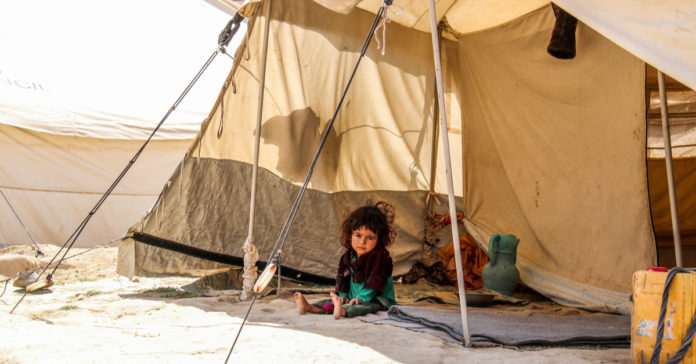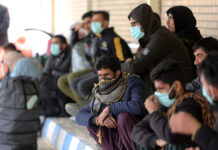
Afghanistan’s economy is in “free fall” and if decisive and compassionate action is not taken immediately it may consume the entire population, the United Nations Emergency Relief Coordinator has said.
Martin Griffiths painted a grim picture of the deteriorating situation unfolding in Afghanistan during a speech at a summit of the Organisation of Islamic Cooperation (OIC) foreign ministers in Islamabad, Pakistan.
He said: “23 million people are facing hunger, malnourished children are overflowing in health facilities, 70 percent of teachers are working without salaries and millions of students are out of schools…
“As the international development support has frozen up, basic social services that all Afghans depend on are collapsing. Families simply do not have the cash for everyday transactions, while the key commodities continue to rise.”
In Afghanistan the cost of wheat and fuel are up by around 40 percent and food now accounts for more than 80 percent of the average household expenditure.
“Within a year, 30 percent of Afghanistan’s Gross Domestic Product could be lost altogether, while male unemployment may double to 29 percent”, Griffiths said.
He cautioned that by the middle of next year universal poverty is set to reach 97 percent of the population of the country.
Subscribe to our newsletter and stay updated on the latest news and updates from around the Muslim world!
However, the UN official welcomed the decision by the World Bank’s Afghanistan Reconstruction Trust Fund to transfer $280 million by the end of December to the UN Children’s Fund (UNICEF) and the World Food Programme (WFP).
He said: “This step should be followed by reprogramming of the whole fund to support the Afghan people this winter.”
The deteriorating situation of the country’s economy is occurring as the value of the Afghani currency plummets, a lack of confidence in the financial sector destroys trade, and the space for borrowing and investment dramatically constricts.
The OIC meeting witnessed the participation of 57 Islamic nations along with delegates from the U.S., China, Russia the European Union and the UN. They collectively expressed their willingness to help avert disaster and contribute to the humanitarian endeavour in Afghanistan.
Griffiths said: “The United Nations stands firmly with you, and in solidarity with the people of Afghanistan. Next year, the UN would seek its largest-ever funding appeal of $4.5 billion to help the most vulnerable in Afghanistan.”
But the UN official said that the plan is a “stopgap measure” for over 21 million people who need lifesaving assistance and must be funded as a matter of priority.
He said: “The crisis is huge. Our humanitarian response is effective and continues to scale up, thanks to generous donor support and your sustained engagement.”
But he emphasised that the country will not get through the winter on emergency aid alone and stressed the need for “flexible donor funding” that can be used to ensure salaries for public sector workers and support to basic services, such as health, education and electricity.
“The consequences of inaction on these three fronts are clear: Afghanistan will collapse, people will run out of hope, and the region – and indeed the world – will see destabilisation increase.”
Currently, more than $9.5 billion of Afghanistan’s foreign assets are frozen by the U.S. administration. The Islamic Emirate’s Deputy Foreign Minister Sher Mohammad Abbas Stanikzai has said: “The impact of frozen funds is on the common people of Afghanistan.”





















